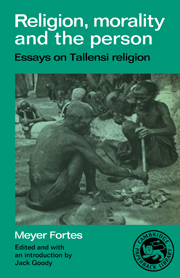Book contents
- Frontmatter
- Contents
- List of figures
- Introduction by Jack Goody
- 1 Divination: religious premisses and logical techniques
- 2 Prayer
- 3 Ritual festivals and the ancestors
- 4 Ancestor worship in Africa
- 5 Ritual and office
- 6 Totem and taboo
- 7 Coping with destiny
- 8 Custom and conscience
- 9 The first born
- 10 The concept of the person
- Endpiece: sacrifice among theologians and anthropologists
- Notes
- References
- Index
Endpiece: sacrifice among theologians and anthropologists
Published online by Cambridge University Press: 13 October 2009
- Frontmatter
- Contents
- List of figures
- Introduction by Jack Goody
- 1 Divination: religious premisses and logical techniques
- 2 Prayer
- 3 Ritual festivals and the ancestors
- 4 Ancestor worship in Africa
- 5 Ritual and office
- 6 Totem and taboo
- 7 Coping with destiny
- 8 Custom and conscience
- 9 The first born
- 10 The concept of the person
- Endpiece: sacrifice among theologians and anthropologists
- Notes
- References
- Index
Summary
What is it that anthropologists and theologians have in common, by way of discipline or by way of ‘problematic’, that makes possible an exchange between them; and, contrariwise, in what ways do their interests and techniques of inquiry diverge? Michael Bourdillon (1980) offers a balanced answer to these questions, one that only someone as equally at home in both camps as he is could provide. Is there anything left for a mere, one-sided social anthropologist to add? I am sometimes impressed by the way in which the theologians and the anthropologists argue from a common ground, and at other times struck by the divergencies, even the contradictions, between their approaches and aims.
No topic in the field of their shared concern with religious institutions and values brings out these alternatives so clearly as does sacrifice. For there is no ritual institution as central to all but a minority of both the scriptural and the non-scriptural religions of mankind. And the alternatives emerge in the ways all the key concepts common to both disciplines are used – concepts such as ‘symbol’, ‘myth’, ‘belief’, ‘meaning’ etc. Not that there is unanimity of usage or definition in either camp; but granted the grey areas of ambiguity on both sides, the differences are clear enough. They are frankly indicated by Bourdillon, most precisely when he contrasts what he describes as the ‘embarrassed silence’ of anthropologists on ‘the relationship between the effects of rituals and what participants expect to achieve through them’, with how theologians regard this relationship.
- Type
- Chapter
- Information
- Religion, Morality and the PersonEssays on Tallensi Religion, pp. 287 - 301Publisher: Cambridge University PressPrint publication year: 1987
- 1
- Cited by

